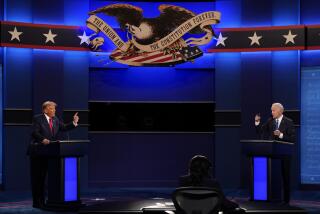The Trashing of Our Public Time : Democracy: The Gulf War debate was a high point in Congressional discourse. Now it’s a factional weapon.
- Share via
Scared out of their wits by the political disaster in store for them, Democrats in Congress are praying for an issue, any issue, that can deflect attention from the party’s reluctance to vote for war two months ago. Meanwhile, Republicans are readying their assaults for 1992. What’s sure to be damaged, though, is democracy, not Democrats.
For one weekend in January, when Congress was considering its war resolution, the nation could watch and listen as its representatives deliberated on a vital and current question. Say what you will about the timidity of Congress up to that point, when it finally got around to debating the war it considered almost all of the relevant arguments. On C-Span and PBS citizens could tune in to the entire debate, and many discovered a newfound respect for their representatives.
Less than three months later, with one side already preparing its attack videos and the other no doubt vowing never to reveal a committed opinion again, we may have seen the last of informed public debate, that rare, endangered and essential use of public time.
Ever since the rise of the automobile and the decline of urban centers, critics have worried about the loss of public spaces. But little has been said about the deterioration of public time.
When shopping malls replace city squares, something is lost to a democratic polity: a structure in which private people can come together to form a public. Public time is a similar sort of structure. It is the temporal frame within which discussion takes place in a democracy. But if important decisions escape discussion, if the forms of public discourse permit no real reckoning with our problems, then public time deteriorates and democracy suffers a quiet demise.
Two current and related symbols of the loss of public time are the savings-and-loan scandal and the television “sound bite.”
News, we all know, is timely information. But in a democracy, “timely” has a particular meaning: in time for public discussion to take its course. The moment of crisis for savings and loans actually passed years ago without ever passing through the arena of public debate--indeed, without ever taking the form of a “moment” in which the potential disaster was publicly recognized and named.
The result is that today we cannot read about the scandal as citizens. We read instead as dupes, victims, outraged taxpayers, discovering after the fact that a series of decisions taken by Congress and the executive added up to a $500-billion disaster. Because these decisions were not made in public time, every new detail of the scandal merely confirms our impotence and irrelevance, our inability to be what democracy promises us we can be--a public.
Events that should have been seen as related were mistakenly (or deliberately) regarded as separate. Patterns went unrecognized, connections were missed. The time it would have taken to make the connections (and make them public) wasn’t taken--by regulators, Congress, the executive, or the press. In this sense, the S & L scandal was a scheme for profiting from the breakdown of public time.
The people in the banking system and the political system were not accountable for living in the present--the actual present they were creating. This may one day be seen as the dominant motif of the Reagan era: collective immunity from the present, costly beyond belief.
Perhaps the clearest indicator of truncated public time is the shrinking television sound bite. According to research done by Daniel Hallin at UC San Diego, the average length of a sound bite during network news coverage of the 1968 campaign was 43 seconds; in 1988 the figure had shrunk to 8.9 seconds. While public problems grow ever more obscure, making it possible for the biggest scandal in U.S. history to pass unnoticed through the political system, the forms of discourse through which notice might be taken are contracting, in part because public time has been made so expensive.
The congressional war debate in January was not politics--or television--as usual. It was politics as public deliberation, made possible by Congress and television working effectively in tandem. If we learned nothing else from this troubling war, we should have learned the value of that brief moment in January, when, like a real democracy, we took the time to deliberate upon our common fate.
Instead, we are ensuring that no such debate will take place again.
More to Read
Get the L.A. Times Politics newsletter
Deeply reported insights into legislation, politics and policy from Sacramento, Washington and beyond. In your inbox twice per week.
You may occasionally receive promotional content from the Los Angeles Times.








